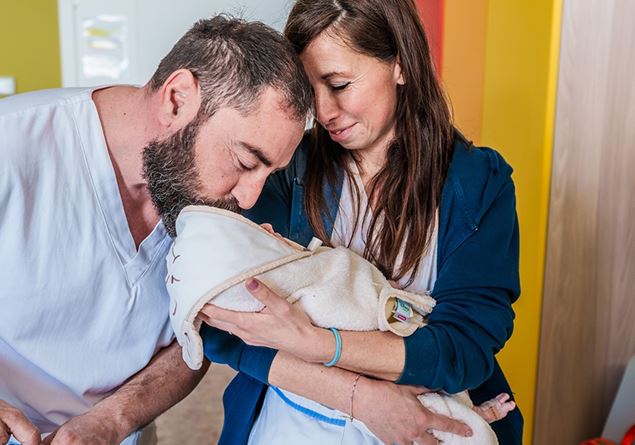In my mid-20s, a gynecologist diagnosed me with polycystic ovary syndrome, or PCOS, a common hormonal condition for which there is no standard test; only a constellation of symptoms can trigger a diagnosis. I was told I could have trouble getting pregnant and was given very little additional information, though internet research suggested I might be at greater risk for diabetes and cardiovascular problems later in life. I always knew I wanted children. I was devastated.
PCOS can be diagnosed if you have two of three symptoms: hyperandrogenism (an excess of the androgen hormones, which are associated with acne, male-pattern hair growth, insulin resistance and weight gain), irregular periods and ovarian cysts. I did not have hyperandrogenism or any of the related physical symptoms, but my periods had never been regular, and an ultrasound revealed my ovaries to have so many cysts, they looked like the craters on the moon.
I started trying to get pregnant in my late 20s, earlier than all my peers, in part because I had been told it might be hard for me. It wasn’t. I got pregnant within two months with my older daughter and conceived the first month I started trying the next time around. That second pregnancy ended in a miscarriage, and I wanted to know if I needed to start trying again immediately. I had my new obstetrician refer me to a gynecologist who was an expert in PCOS, unlike the doctor who originally gave me the diagnosis (I left her practice because she had been so dismissive of my questions and concerns).
“You don’t have it,” the expert told me, after running a battery of tests. Even though my periods never ran on a strict 28-day schedule, I did ovulate, and the cysts on my ovaries were unexplained but benign. The irregular periods could have been caused by stress or overexercising. Even if I did have it, women without hyperandrogenism do not seem to have the same risk profile for future disease as women who do have hyperandrogenism. I was both completely relieved and a little angry. I spent years worrying about my fertility — including tears and sleepless nights when I was first diagnosed — for no reason.
I got pregnant again with my younger daughter six months after that visit in 2015 and forgot about the whole thing for a decade, until last month, when I saw a BBC article about influencers selling fake cures for PCOS — like dietary supplements, for which there is no evidence.
“There is no one standard test for PCOS,” said Dr. Rhoda Cobin, a clinical professor of endocrinology at the Icahn School of Medicine at Mount Sinai. “It’s not like you can say, oh, if your blood sugar’s over 200, you have diabetes or whatever. So it’s a constellation of symptoms and signs and history.” This helps explain why the illness is such fertile ground for influencing nonsense. Every expert I spoke to said underdiagnosis of PCOS is still a problem, and lots of women are unnecessarily suffering because of it.
But I was haunted by my own experience. It turns out that overdiagnosis is also an issue, and a lack of high-quality evidence on the syndrome is the root cause of both. According to the most up-to-date international guidelines on PCOS, from 2023, while evidence for diagnosis and management of the condition has improved over time, it remains “generally low to moderate quality. Significantly greater research is now needed in this neglected, yet common condition.”
A 2024 study of PCOS-related posts on TikTok, Instagram and Reddit showed that a “financial conflict of interest was present in 45 percent of TikTok posts and 89 percent of Instagram posts.” Influencers selling diet plans — often keto and carnivore-based schemes — to ameliorate PCOS symptoms are abundant on social media. That’s despite the fact that “there is no solid evidence to suggest that a restrictive diet in the long term has any significant impact on PCOS symptoms,” according to my colleague Alisha Haridasani Gupta.
Complicating matters further, there has been significant controversy over what constitutes the syndrome. The diagnostic guidelines expanded in 2003 — just a few years before I was initially diagnosed — increased the percentage of women who could be diagnosed with PCOS to 20 percent from 5 percent. “Including more women in a diagnostic net is not a value-free activity,” Dr. Jane Wilcock and Dr. David Taylor wrote in a 2018 article for the British Journal of General Practice. “Each individual will change from a person with a problem to a patient. We know this adversely affects people.”
The guidelines have been tweaked over the years, and the most recently updated 2023 recommendations have added a lot of nuance back into the diagnosis, but confusion and disagreement still remain.
When there is a gap in knowledge on any women’s health issue, it leaves the door open for all manner of scams. “Because traditional medicine is not meeting women’s needs, they’re particularly vulnerable to these sorts of things online,” said Dr. Tessa Copp, a research fellow at the University of Sydney School of Public Health who studies the overdiagnosis of PCOS. “And it kind of stems back to the whole underrecognition, underappreciation and underfunding of women’s health more broadly.”
Dr. Copp told me that in her research she talked to many women whose relationships and fertility plans were adversely affected by an incorrect PCOS diagnosis. Because they thought they would have difficulty conceiving, some had babies before they felt emotionally ready, Dr. Copp said, or took risks with contraception that led to unintended pregnancies. At the same time, when women have severe symptoms, having the diagnosis was “so validating and legitimizing and provided them with a label to describe their experience,” she said.
But what else should women, and their doctors, know? Dr. Cobin told me that a PCOS diagnosis should be made carefully, and especially with some teenagers, doctors should take a wait-and-see approach. That’s because a lot of the symptoms — irregular periods, ovarian cysts, acne and an increase in body hair — can be a normal part of female adolescence.
Irregular or missed periods, for example, can have a variety of causes, including extreme stress and disordered eating. And there is a range of normal female hairiness, but because women are socialized to think having almost no body hair is “feminine,” young women may be worried that there’s something wrong with them when body hair appears in new places. “It’s absolutely crackers because all you’re doing is you’re defining your norm as very narrow something which somebody on the internet’s probably given you,” Dr. Wilcock, who recently retired as a general practitioner after 35 years of service, told me .
Whether or not you have an official diagnosis in the near term, the individual symptoms of PCOS can be treated, Dr. Cobin said. Drugs like tirzepatide and semaglutide can be used to treat insulin resistance that is related to PCOS, birth control pills can treat the irregular periods, and metformin can improve ovulation for fertility problems.
Recent studies have shown that women diagnosed with PCOS are just as likely to have children as women without it, though they may take a bit longer to get pregnant and have fewer children. Still, the idea that the syndrome is a fertility death sentence is outdated. It’s a conclusion I came to based on a lack of information from my original doctor and too much late-night web searching in 2008. And it’s a fear that is peddled by financially motivated, uncredentialed health influencers in 2025. It doesn’t mean it’s true.







